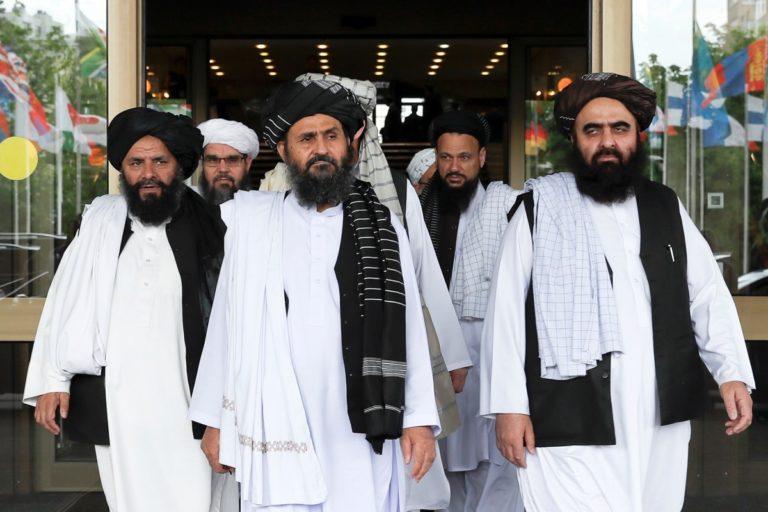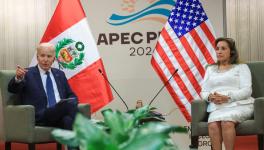Trump’s Volte-Face on Pakistan is a Moment of Truth For India

A Taliban delegation led by Abdul Ghani Baradar (centre) visited China recently, according to Beijing.
The announcement in Washington on Wednesday regarding Pakistan Prime Minister Imran Khan’ visit to the United States cannot but be noted as a watershed event in regional politics.
At its most obvious level, the announcement coincides with the news coming out of Doha that the US and Taliban have resolved their differences over the four issues that were discussed through the seven rounds of talks in the Qatari capital — counterterrorism assurances, troop withdrawal, a ceasefire and intra-Afghan talks.
Taliban’s chief negotiator Abbas Stanekzai told reporters in Doha on Monday, “We do not have any disagreement with Americans. Only there is the draft [agreement] which needs to be finalised. When it is finalised, we will share it with media.” The White House announcement on Wednesday signals that a draft peace agreement between the US and the Taliban regarding US troop withdrawal and ceasefire is indeed ready for signature in the near future.
Alongside, the rival Afghan sides have also come up, following the so-called intra-Afghan dialogue in Doha on Monday sponsored by Qatar and Germany and under the watchful eyes of American diplomats, with a ‘road map for peace’ which aims ‘to reduce civilian casualties to zero’.
The US Special Representative for Afghanistan Reconciliation Zalmay Khalilzad has left Doha for China en route to Washington. Clearly, Beijing played a key role in the peace talks and the visit of Taliban leader Mullah Baradar to Beijing last month probably became the turning point in the negotiations in Doha. This underscores once again the growing complexity of the US-China ‘rivalry’, which we in India blithely tend to overlook at times.
Within six weeks of the Pentagon’s Indo-Pacific Strategy Report, making wholesome condemnation of China as a ‘revisionist power’ that the US is determined to counter on all fronts (in league with partners such as India), we have the curious gesture by Khalilzad to show appreciation to Beijing as an indispensable interlocutor for bringing the ‘endless war’ in Afghanistan to an end and to create conditions for the orderly withdrawal of US (and NATO) troops from that region. Indeed, it is an incredible spectacle of how priorities shift in the US diplomacy when its self-interests are involved.
The heart of the matter is that President Trump’s invitation to Imran Khan goes way beyond a show of token gratitude for Pakistan’s cooperation in making the peace agreement with Taliban. Actually, Pakistan has not made any major concessions on its Afghan agenda. It simply facilitated the peace talks by leveraging its influence on the Taliban. The Pakistani objective of restoring the Taliban to mainstream Afghan politics — highly likely with a lead role — and creating ‘strategic depth’ vis-a-vis India is very much intact.
Make no mistake, the leitmotif of the US-Pakistani rapprochement is that a new regional security paradigm is taking shape. Pakistan is being assigned a pivotal role to ensure that Afghanistan will never again be a ‘lab of terrorists’ (to use Trump’s words) threatening the western world. Pakistan is hugely experienced in handling its relations with the US and it will of course make sure that the US reciprocates — politically, financially, militarily.
If Trump had praised India as the ‘critical part’ of his unfolding Afghan strategy in August 2017, he is now replacing India with Pakistan in a most curious reversal of roles in South Asia’s regional security paradigm. The White House announcement says explicitly that Imran Khan’s visit will ‘focus on strengthening cooperation between the United States and Pakistan to bring peace, stability, and economic prosperity to a region that has seen far too much conflict.’
It goes on to say that the US is meeting Pakistan’s longstanding demand for a wide-ranging, full-bodied relationship on par with US-Indian relations, ‘including counterterrorism, defense, energy, and trade.’ More importantly, in what can only be regarded as a veiled reference to the Kashmir issue and India-Pakistan tensions, the White House says that the US will keep in sight ‘the goal of creating the conditions for a peaceful South Asia and an enduring partnership between our two countries.’
To be sure, Washington has marginalised India and ignored its sensitivities regarding the Afghan situation by choreographing the post-war scenario in Afghanistan almost exclusively with Pakistan (and China.) And, yet, India-US relationship was supposed to be one between ‘natural allies’ and was described until fairly recently as the ‘defining partnership’ of the 21st century.
From the Indian perspective, therefore, Trump’s invitation to Imran Khan to visit the White House is a bitter pill to swallow. At best, it can put a brave face on the colossal setback to its regional policies during the past five years, which stubbornly refused to engage Pakistan in dialogue, strove to ‘isolate’ Pakistan as a state sponsoring terrorism, regarded Afghanistan primarily as a proxy war with Pakistan, refused to regard Taliban as an Afghan entity and fantasised an Indian-American convergence over regional security in regard of Afghanistan.
Clearly, when it comes to Afghanistan, Pakistan is Washington’s preferred partner, while India’s assigned role will be to serve as a doormat for the US’ containment policies against China, bandied about as its ‘Indo-Pacific strategy’. The Indian foreign policy elites owe an explanation as to how this bizarre situation came about. The entrenched Sinophobia in the Indian mindset has clouded rational thinking.
The emerging regional security scenario thoroughly exposes the myths shrouding India’s ‘defining partnership’ with the US and scatters the delusional thinking that what is quintessentially a transactional relationship rests on the bedrock of ‘shared values’ and ‘common concerns’ between the two countries. It was never really an equal relationship based on respect and trust or transparency — leave alone strategic convergence.
In retrospect, Prime Minister Narendra Modi’s initiative through the last year and a half to build a warm personal relationship with President Vladimir Putin with a view to revive the India-Russia relationship that was systematically atrophied as a matter of Indian policy during the past decade (with an unspoken agenda to give more ballast to the budding military ties with the US), and to expand and deepen the strategic communication with China following the Wuhan summit with President Xi Jinping with a view to improve India-China relations came not a day too soon.
That providential transition — for which wide acceptance is still lacking within our strategic community — significantly enhances India’s capacity today to adjust to the emerging US-Pakistani entente over post-war Afghanistan.
Get the latest reports & analysis with people's perspective on Protests, movements & deep analytical videos, discussions of the current affairs in your Telegram app. Subscribe to NewsClick's Telegram channel & get Real-Time updates on stories, as they get published on our website.
























